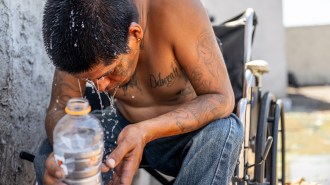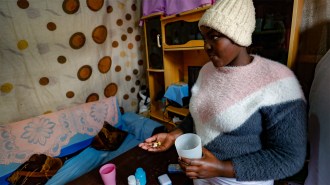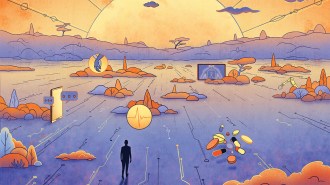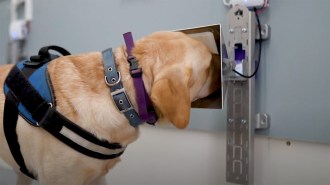
Meghan Rosen is a senior writer who reports on the life sciences for Science News. She earned a Ph.D. in biochemistry and molecular biology with an emphasis in biotechnology from the University of California, Davis. Her dissertation work involved studying mutated proteins in liver and kidney cancer. She later graduated from the science communication program at UC Santa Cruz. Prior to joining Science News in 2022, she was a media relations manager at the Howard Hughes Medical Institute. Her work has appeared in Wired, Science, and The Washington Post, among other outlets. Once for McSweeney’s, she wrote about her kids’ habit of handing her trash, a story that still makes her (and them) laugh.

Trustworthy journalism comes at a price.
Scientists and journalists share a core belief in questioning, observing and verifying to reach the truth. Science News reports on crucial research and discovery across science disciplines. We need your financial support to make it happen – every contribution makes a difference.
All Stories by Meghan Rosen
-
 Health & Medicine
Health & Medicine6 things to know about antidepressants
An abundance of data show that SSRIs, a class of drugs commonly used as antidepressants, are effective, though, like any drug, they have risks.
-
 Science & Society
Science & SocietyIt’s ‘personal.’ What the Stand Up for Science rally meant for attendees
Stand Up for Science rallies in Washington, D.C., and across the United States drew crowds of people worried about cuts to scientific funding.
-
 Health & Medicine
Health & MedicineA pancreatic cancer blood test called PAC-MANN could spot the disease early
The test relies on a magnetic nanoparticle linked to fluorescent molecules to detect pancreatic cancer proteins.
-
 Climate
ClimateJust a small rise in global temperatures could be deadly
As early as mid-century, an area of land that adds up to the size of the U.S. could hit temperatures hazardous for human health.
-
 Science & Society
Science & SocietyTrump orders sow chaos in global public health
A recent flurry of executive orders and surprise actions by the Trump administration have roiled WHO, the CDC and the international public health community.
-
 Health & Medicine
Health & MedicineTrump is withdrawing the U.S. from WHO. Here’s what that means
When Trump’s move to leave WHO takes effect in a year, it may gut funding for global public health and limit U.S. access to crucial data, experts warn.
-

Why the FDA banned the common food dye Red No. 3
Evidence that the synthetic dye Red No. 3 is harmful comes from studies in rats, not people. Food companies now have two years to remove it from products.
-
 Health & Medicine
Health & MedicineLethal snake venom may be countered by new AI-designed proteins
The current way to produce antivenoms is antiquated. Experiments in mice suggest that an artificial intelligence approach could save time and money.
-
 Health & Medicine
Health & MedicineU.S. dementia cases may rise to 1 million per year by 2060
Baby Boomers may drive a drastic increase in dementia cases in coming decades, but there are steps people can take to reduce their risk.
-
 Health & Medicine
Health & MedicineAI could transform health care, but will it live up to the hype?
AI has the potential to make health care more effective, equitable and humane. Whether the tech delivers on these promises remains to be seen.
-
 Health & Medicine
Health & MedicineShort bursts of physical activity cut women’s risk of heart attack
Even just a few minutes of vigorous movement per day lowers the risk of serious cardiovascular problems, like heart attack and heart failure, in women.
-
 Health & Medicine
Health & MedicineDogs team up with AI to sniff out cancer
Scientists paired Labrador retrievers with an AI model in a new screening test for breast, lung, colorectal or prostate cancer.